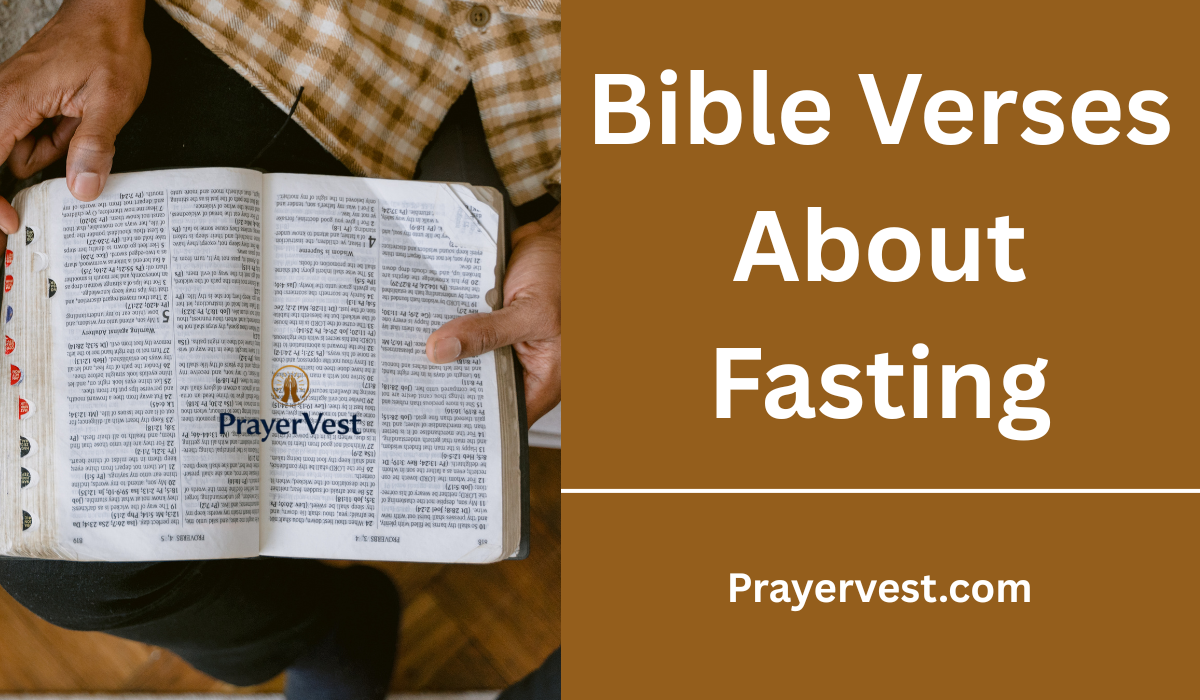One of the most effective—yet frequently disregarded—spiritual practices in the Bible is fasting. Scripture portrays fasting as a holy ritual that God’s people follow in order to find strength, clarity, repentance, and divine intervention.
Fasting was used by the Old Testament prophets and the early church as a means of humbling oneself before God, calming the world’s cacophony, and bringing one’s heart into harmony with His will. It is a purposeful act of spiritual devotion that pulls believers into a closer relationship with God and goes beyond merely refraining from eating.
Biblical characters used fasting as a means of gaining divine insight and insight at times of crisis, decision-making, or spiritual conflict. Daniel fasted to gain insight, Moses fasted to hear God’s laws, and Esther called for a nationwide fast before going to the king.


Before starting His earthly ministry, Jesus fasted for forty days, highlighting the significance of spiritual preparation. These narratives demonstrate that fasting is not only historical but also extremely pertinent to modern believers who are looking for God’s guidance and presence in their lives.
Fasting is being rediscovered by many Christians today as a way to experience spiritual rejuvenation, liberation, and closeness to God. Fasting, whether done alone or in a group, fosters an environment where the heart is more receptive to God’s guidance and the soul is more aware of His voice. Bible passages regarding fasting aid believers in comprehending its goal, its effectiveness, and the attitude God wishes during these times of devotion. These verses encourage us to undertake fasting with sincerity, expectation, and trust in addition to providing guidance.
40 Powerful Bible Verses About Fasting (2026)
1. Joel 2:12
“Even now,” declares the Lord, “return to me with all your heart, with fasting and weeping and mourning.”
This verse reveals fasting as a profound act of returning to God with sincerity and brokenness. Israel had wandered far from God, yet He extends an invitation for wholehearted repentance. Fasting becomes a physical expression of an inward turning—a way to humble ourselves and strip away distractions so that genuine repentance can take root. This passage reminds us that fasting is not simply about abstaining from food but about posturing the heart toward God in humility, surrender, and deep spiritual sensitivity.
2. Ezra 8:23
So we fasted and petitioned our God about this, and he answered our prayer.
Facing a dangerous journey without military protection, Ezra leads the people in fasting to seek God’s covering. Their fast becomes a declaration of total dependence—not on human strength or armies but on divine intervention. This verse highlights the power of fasting in times of vulnerability and uncertainty. When we choose to rely on God rather than earthly securities, fasting sharpens our faith and aligns our hearts with God’s protection, guidance, and deliverance.
3. Daniel 9:3
So I turned to the Lord God and pleaded with him in prayer and petition, in fasting, and in sackcloth and ashes.
Daniel responds to prophetic revelation with fervent prayer and fasting, showing that divine insight requires divine pursuit. His posture reflects deep reverence and urgency—recognizing that understanding spiritual matters demands discipline and consecration. Fasting becomes a tool for clarity, focus, and intercession. This verse teaches that when God reveals something, we are called to press deeper into Him to understand, align, and intercede according to His will.
4. Matthew 6:16
“When you fast, do not look somber as the hypocrites do…”
Jesus teaches that fasting must be rooted in authenticity, not performance. In a culture where spiritual disciplines were often displayed for admiration, Jesus redirects fasting toward God alone. The focus is not on appearing holy but on being truly surrendered. This verse exposes the danger of religious pride and reminds us that fasting is an intimate offering before God—meant to deepen devotion, not to impress others. True fasting reshapes the heart, not the reputation.
5. Isaiah 58:6
“Is not this the kind of fasting I have chosen: to loose the chains of injustice…?”
God confronts Israel’s empty fasting rituals and redefines fasting as an instrument of justice, compassion, and transformation. True fasting breaks spiritual chains, softens hardened hearts, and moves us toward acts of mercy. It is not merely abstention from food—it is participation in God’s heart for righteousness. This verse powerfully shows that spiritual disciplines must lead to ethical living. Fasting aligns us with God’s compassion, urging us to act on behalf of the oppressed.
6. Acts 13:2
While they were worshiping the Lord and fasting, the Holy Spirit said, “Set apart for me Barnabas and Saul…”
In the early church, fasting created an atmosphere for divine direction. As the believers worship and humble themselves, the Holy Spirit releases clarity about their mission. This moment reveals how fasting sharpens spiritual hearing and positions us to discern God’s calling. Fasting is not passive; it is an active pursuit of God’s voice. Through it, God reveals assignments, launches ministries, and directs His people into purpose.
7. Psalm 35:13
…I humbled myself with fasting.
David turns to fasting as an act of humility in times of distress and intercession. Instead of responding with anger or self-defense, he lowers himself before God. This verse highlights fasting as a pathway to humility—subduing the flesh and elevating dependence on God. It is a voluntary posture of surrender that transforms inner attitudes, leading to compassion, patience, and spiritual sensitivity even amid conflict or misunderstanding.
8. Esther 4:16
“Do not eat or drink for three days… I and my attendants will fast as you do.”
Facing annihilation, Esther calls for a national fast, demonstrating the power of collective intercession. Fasting becomes the catalyst for divine intervention and the courage to act. This verse demonstrates that fasting can transform seemingly impossible situations and empower us to take bold steps in alignment with God’s plan. When an entire community humbles itself, heaven responds—and destinies are preserved. Fasting here becomes both a spiritual weapon and a source of supernatural boldness.
9. Nehemiah 1:4
When I heard these things, I sat down and wept. For some days I mourned and fasted and prayed before the God of heaven.
Nehemiah’s immediate response to Jerusalem’s devastation is not action but deep spiritual brokenness expressed through fasting. His fast becomes a bridge between grief and divine strategy. Rather than rushing into solutions, he seeks God’s heart first, demonstrating that true rebuilding—whether of a life, a family, or a nation—begins in the secret place. This verse teaches us that fasting positions us to receive God’s plans, not merely react to circumstances.
10. 2 Samuel 12:16
David pleaded with God for the child. He fasted and spent the nights lying in sackcloth on the ground.
In profound distress, David turns to fasting as an act of desperate intercession. While the outcome was not what he hoped, his fast reveals the raw honesty with which we can approach God. Fasting becomes a means of pouring out our deepest pain and seeking divine mercy. This verse reminds us that fasting does not manipulate God but aligns our hearts with His sovereignty—even when His answer differs from our desires.
11. Acts 14:23
Paul and Barnabas appointed elders… with prayer and fasting, committing them to the Lord.
The early church treated leadership decisions with utmost spiritual seriousness, demonstrated by pairing fasting with prayer. This shows that fasting is not only for crisis but also for spiritual alignment and commissioning. Through fasting, the church invited God’s guidance, wisdom, and affirmation. This verse emphasizes that major decisions—especially spiritual ones—are most fruitful when birthed in seasons of consecration.
12. Jonah 3:5
The Ninevites believed God. A fast was proclaimed, and all of them… fasted.
The wicked city of Nineveh responds to Jonah’s message with massive repentance, expressed tangibly through fasting. Their collective humility moves God to show mercy rather than judgment. This verse reveals the transformative power of fasting when it flows from genuine repentance. It reminds us that no person or nation is beyond redemption when humility replaces pride and spiritual urgency leads to fasting and repentance.
13. Matthew 4:2
After fasting forty days and forty nights, he was hungry.
Before beginning His ministry, Jesus underwent a prolonged fast, modeling the highest form of spiritual preparation. His fast fortifies Him for temptation, clarifies His mission, and demonstrates absolute dependence on the Father. This verse shows that fasting strengthens spiritual resilience and authority. When practiced with purity, fasting sharpens the spirit, weakens the flesh, and positions us for victory over spiritual battles.
14. Luke 2:37
She never left the temple but worshiped night and day, fasting and praying.
Anna’s lifelong devotion expresses itself through continual prayer and fasting. Her discipline births prophetic insight, allowing her to recognize Jesus as the promised Messiah. This verse highlights fasting as a lifestyle of intimacy. Fasting is not restricted to emergencies; it becomes a rhythm of worship, longing, and deep fellowship with God. Those who cultivate such devotion often perceive divine movements that others overlook.
15. 1 Corinthians 7:5
…so that you may devote yourselves to fasting and prayer.
Paul acknowledges fasting as a sacred practice that deepens spiritual focus, even in marriage. Temporary abstinence is encouraged not for deprivation but for devotion. This verse illustrates that fasting requires intentional setting aside of normal routines to seek God with greater intensity. It highlights the balance of spiritual discipline within everyday life and teaches that fasting, done rightly, enriches both personal and relational holiness.
16. Psalm 69:10
When I weep and fast, I must endure scorn.
David’s fasting brings not admiration but ridicule, revealing that true spiritual hunger often invites misunderstanding. Yet David persists, demonstrating that fasting is an expression of devotion independent of public opinion. This verse teaches that genuine fasting is an inward pursuit of God—even when outwardly misunderstood. Our commitment to God must outweigh the discomfort of criticism or isolation.
17. Daniel 10:2-3
At that time I, Daniel, mourned for three weeks. I ate no choice food…
Daniel engages in a partial fast seeking heavenly understanding. His disciplined abstinence reflects spiritual hunger that surpasses physical desire. God responds by sending angelic revelation, revealing the spiritual warfare behind delayed answers. This passage shows that fasting opens the spiritual realm, unveiling insights and breakthroughs hidden from natural sight. Fasting becomes a key to divine revelation and victory.
18. Matthew 17:21
“This kind does not go out except by prayer and fasting.”
Jesus explains that certain spiritual challenges require a higher level of consecration. Fasting intensifies the believer’s spiritual authority, aligning them with God’s power to confront stubborn strongholds. This verse highlights the relationship between fasting and supernatural breakthrough. In moments where ordinary faith seems insufficient, fasting elevates spiritual potency and opens the door to deeper victory.
19. Judges 20:26
All the Israelites… sat weeping before the Lord. They fasted that day until evening.
After a devastating loss, Israel turns to fasting for direction and comfort. Their fast is an expression of grief, surrender, and the desperate need for God’s intervention. This verse shows that fasting is appropriate in seasons of confusion and hardship, allowing us to posture ourselves to receive divine guidance. Even in crisis, fasting becomes a pathway to fresh clarity and renewed strength.
20. 1 Kings 21:27
When Ahab heard these words, he tore his clothes… and fasted.
Ahab’s fast—though imperfect—demonstrates that humility can avert judgment. His act of repentance moves God to reconsider immediate punishment. This verse reveals the extraordinary mercy of God, who responds even to incomplete repentance when expressed through humility and fasting. It teaches that fasting can soften the hardest hearts and invite divine compassion even in moments of deserved consequence.
21. Luke 4:2
Where for forty days he was tempted by the devil. He ate nothing during those days…”
Luke emphasizes Jesus’ sustained fast as the context for His confrontation with the enemy. Fasting was not a passive discipline—it was the arena in which spiritual warfare occurred. Jesus’ victory over temptation flowed from deep spiritual fortification and intimacy with the Father achieved through fasting. This verse reminds believers that fasting both strengthens us against temptation and equips us to stand firm when confronted by spiritual opposition.
22. 2 Chronicles 20:3
Alarmed, Jehoshaphat resolved to inquire of the Lord, and he proclaimed a fast for all Judah.
When faced with an overwhelming military threat, Jehoshaphat doesn’t turn first to strategy but to fasting. His immediate instinct is spiritual dependence, not military calculation. The nation unites in humility, seeking divine instruction, and God responds with supernatural deliverance. This passage shows that fasting in moments of crisis invites divine intervention that surpasses human capabilities. It teaches us to seek God before seeking solutions.
23. Ezra 10:6
He did not eat food or drink water, because he continued to mourn over the unfaithfulness of the exiles.
Ezra’s fast reflects deep grief over the nation’s sin. His abstinence from food is not ritualistic—it is an outward expression of inward sorrow. This verse teaches that fasting can be an act of corporate repentance, standing in the gap for others. In times when spiritual compromise is widespread, fasting becomes both a cry for mercy and a step toward restoration.
24. Psalm 109:24
My knees give way from fasting; my body is thin and gaunt.
David describes the physical toll of prolonged fasting, revealing the depth of his desperation before God. This verse shows that fasting, when done sincerely, may stretch us beyond comfort. Yet spiritual intensity often requires physical sacrifice. David’s experience teaches us that fasting is not about maintaining strength but surrendering it—recognizing human frailty and divine sufficiency. Spiritual breakthroughs sometimes emerge from places of deep weakness.
25. Nehemiah 9:1
The Israelites gathered together, fasting and wearing sackcloth and putting dust on their heads.
This national fast marks a time of confession, renewal, and covenant restoration. Fasting ushers the people into a posture of humility necessary for real transformation. This verse demonstrates the power of corporate fasting to unify a community in repentance and recommitment to God. When people pour out their hearts together, God often responds with collective renewal and spiritual awakening.
26. Matthew 6:18
“…your Father, who sees what is done in secret, will reward you.”
Jesus assures His followers that private fasting carries divine recognition. God values sincerity over spectacle, and fasting becomes a deeply intimate transaction between the believer and the Father. This verse reminds us that the true fruit of fasting—breakthrough, clarity, intimacy, and renewal—often happens unseen by others. When we fast with pure motives, God responds with rewards that transcend human affirmation.
27. Luke 5:35
“But the time will come when the bridegroom will be taken from them; in those days they will fast.”
Jesus predicts that His disciples will fast in His physical absence, revealing fasting as an expression of longing for His presence. This verse frames fasting as relational rather than ritualistic. It is a way of drawing near to God when His nearness feels distant. Fasting becomes an act of hunger for divine intimacy, reminding us that the deepest purpose of fasting is simply to be closer to Him.
28. Esther 9:31
…the matters of their fasting and lamenting.
This verse highlights fasting as an ongoing part of Israel’s spiritual rhythm even after victory. What began as an emergency fast becomes a memorial practice of remembering God’s deliverance. It teaches that fasting is not only for crisis moments but also for cultivating remembrance, gratitude, and spiritual consistency. It keeps the community anchored in the stories of God’s faithfulness.
29. Jeremiah 36:9
In the ninth month all the people… proclaimed a fast before the Lord.
The nation calls for a fast during a time of warning and impending judgment. Fasting becomes a collective act of sensitivity—an acknowledgment that God is speaking and the people must respond. This verse reveals fasting as a means of aligning a community with God’s voice. When spiritual danger looms, fasting brings clarity, sobriety, and readiness to obey.
30. Acts 10:30
“Four days ago I was fasting until this hour…”
Cornelius’ fast precedes a supernatural visitation and the opening of the gospel to the Gentiles. His devotion triggers a divine encounter that transforms the course of Christian history. This verse shows that fasting can prepare the heart for divine revelation and new spiritual horizons. Fasting removes barriers, sensitizes the spirit to God’s movements, and opens doors to extraordinary moments of grace.
31. Isaiah 58:8
“Then your light will break forth like the dawn, and your healing will quickly appear…”
In God’s description of true fasting, He promises profound spiritual and physical renewal. When fasting is rooted in compassion, justice, and humility, it releases divine blessing. This verse shows that fasting is not merely an inward act but one that positions us for God’s transforming power. Healing, restoration, and breakthrough often follow seasons of sincere fasting. It reminds us that when we align with God’s heart, He brings clarity, favor, and renewal.
32. Joel 1:14
“Declare a holy fast; call a sacred assembly…”
Joel calls for a national fast in response to disaster, framing fasting as a holy and urgent response to crisis. This verse shows that fasting is not casual—it is sacred. It gathers the community to cry out to God with one voice. When the spiritual atmosphere is heavy, fasting becomes an act of collective intercession that invites God’s mercy and intervention. It underscores that some seasons require unified spiritual action.
33. Zechariah 7:5
“When you fasted and mourned… was it really for me that you fasted?”
God challenges the motives behind Israel’s long-practiced fasts. Their rituals had become empty traditions devoid of genuine devotion. This verse warns that fasting without a God-centered heart is spiritually hollow. It reminds us that the power of fasting lies not in the act itself but in the intention behind it. True fasting must be directed toward God, shaped by sincerity, humility, and a desire for transformation—not routine or self-righteousness.
34. Acts 27:33
“…You have been in constant suspense and have gone without food…”
In the midst of a life-threatening storm at sea, the crew involuntarily enters a kind of fast because of fear and uncertainty. Although not a spiritual fast, this moment reveals how crisis can strip life down to essentials. Paul urges them to eat to regain strength, showing the balance between physical needs and spiritual focus. This verse reminds us that fasting should be intentional, not driven by fear—and that spiritual discipline must coexist with wisdom concerning the body.
35. Judges 20:26
“…They fasted that day until evening…”
After suffering a devastating defeat, the Israelites fasted to seek God’s direction. Their fast becomes an expression of desperation and surrender. This verse highlights how fasting creates space for divine clarity and renewal after failure. It teaches that fasting is especially powerful in seasons when answers seem elusive. In moments of confusion, fasting aligns us with God’s perspective and positions us for divine instruction.
36. 1 Samuel 7:6
“On that day they fasted and there they confessed…”
Samuel leads Israel in a fast of repentance as they return to God after years of spiritual compromise. Their fasting is accompanied by confession, signaling genuine transformation. This verse emphasizes that fasting often goes hand in hand with repentance. When the heart is softened through fasting, confession becomes natural, and renewal follows. It shows that fasting can break cycles of spiritual bondage and restore a relationship with God.
37. Isaiah 58:9
“Then you will call, and the Lord will answer; you will cry for help, and he will say: Here am I.”
This verse reveals God’s powerful response to genuine fasting. When fasting flows from compassion and righteousness, God becomes near, responsive, and attentive. It highlights fasting as a spiritual accelerator of divine attention—not because it forces God’s hand, but because it aligns our hearts with His will. In seasons of fasting, heaven’s “Here am I” becomes more tangible, and God’s guidance becomes clearer.
38. Philippians 3:19
“…their god is their stomach…”
While not directly about fasting, this verse exposes the dangers of being ruled by physical appetites. It underscores the spiritual value of disciplines like fasting that dethrone the flesh and place God back at the center. Fasting trains the body to yield to the spirit, helping believers resist temptations that arise from unchecked desires. This verse reminds us that fasting is part of a broader posture of self-denial and spiritual focus.
39. Romans 14:17
“For the kingdom of God is not a matter of eating and drinking…”
This verse elevates spiritual realities above physical ones. While not a direct command to fast, it reinforces that the kingdom is centered on righteousness, peace, and joy—not pleasure or consumption. Fasting helps believers realign their priorities with kingdom values. This passage reminds us that spiritual depth is nurtured when physical desires are dethroned and the heart becomes more sensitive to God.
40. Matthew 9:14-15
“How is it that we and the Pharisees fast often, but your disciples do not fast?”
Jesus explains that fasting is connected to His presence. While He was physically with them, fasting was unnecessary—but after His departure, fasting would become essential. This passage clarifies that fasting is rooted in longing for Christ and anticipating His movement. True fasting flows from love, desire for intimacy, and anticipation of divine revelation. It teaches that fasting is not legalistic—it is relational hunger for the Bridegroom.
Conclusion
For Christians, fasting continues to be one of the most transformational spiritual practices. Scripture demonstrates that fasting is a potent act of surrender that opens the heart to God’s presence and guidance rather than just a ritual or religious obligation. The Bible repeatedly demonstrates that those who fast with sincerity and humility receive significant spiritual impact, whether it be for repentance, a breakthrough, guidance, or a closer relationship with God. These verses serve as a reminder that fasting is a holy call to put aside distractions, calm the soul, and pursue God with fresh clarity.
Allow these biblical passages regarding fasting to influence your comprehension and application of this spiritual discipline as you reflect on them. Consider fasting as a means of achieving more power, clarity, and spiritual rejuvenation rather than as a burden. Knowing that God honors those who sincerely seek Him, let God’s Word inspire you to fast with anticipation. Scripture provides eternal guidance and inspiration to help you become closer to God and strengthen your faith, regardless of how long you have been fasting.






